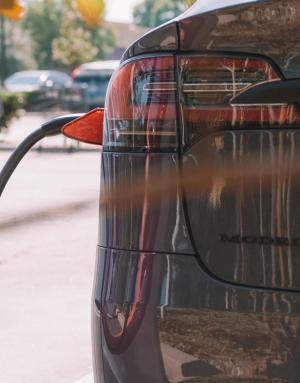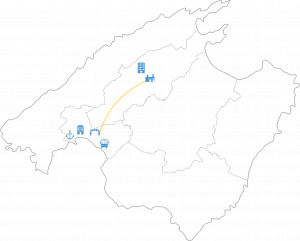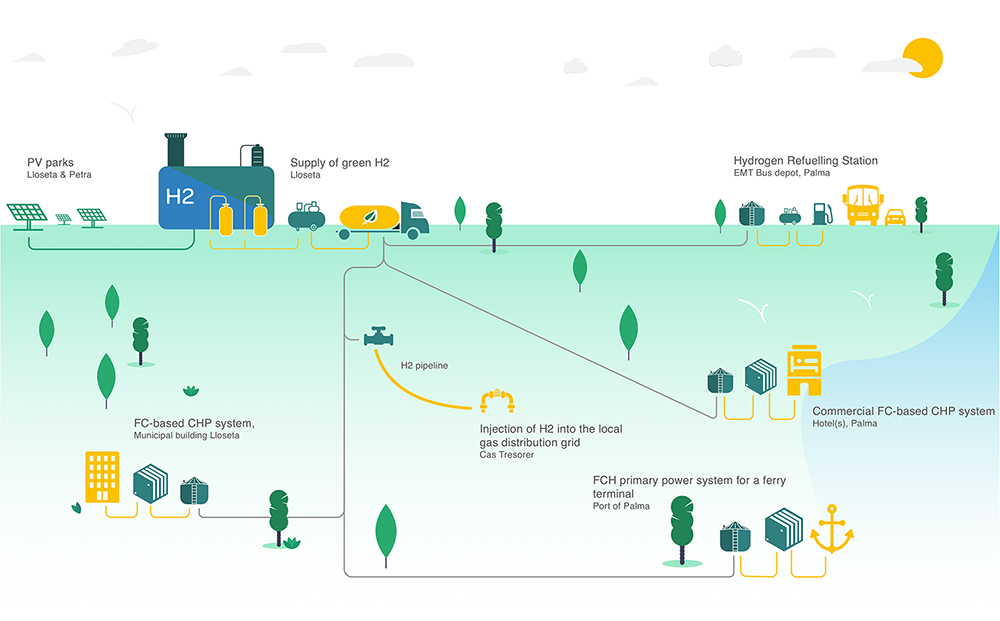
News
21 March 2022
ENERGY INDEPENDENCE ON THE BALEARIC ISLANDS
An island archipelago receiving millions of tourists every year needs to approach its use of resources very carefully. Energy production, transportation and consumption are one of the priority areas of action in establishing an independence from fossil fuels and reducing carbon emissions.
The Public Authorities of the Balearic Islands passed an ambitious Climate Change and Energy Transition and Energy Transition Law in 2019 which sets the basis for the actions which will boost the use of renewable energy and activate all possible areas of change to a greener future for the Balearics.
The Balearic Climate and Energy Transition Law defines targets for all areas of energy transition.
Emission reductions:
a) 40 % by 2030
b) 90 % by 2050
Reduction of energy consumption:
a) 26% by the year 2030
b) 40% by the year 2050
Use of renewable energy:
a) 35% by the year 2030
b) 100 % by 2050 (70 % produced locally).
A total of 233 M € will be invested on behalf of the Balearic Islands Public Authorities in the quest for energy transition via the creation of promotion offices, aid for the promotion of the energy transition and investments in innovation.
Many challenges are unique to the Balearic Islands and they have not been addressed so far. The islands require new models of electric mobility, decarbonisation of the sea and efficiency in the water cycle. The fact that our islands have a limited territory and geographic distance to cover make them a perfect testing ground for these new approaches, which can easily be presented, analyzed and scaled on an international level. The millions of visitors the islands receive each year become the perfect ambassadors for this green transition.
The plan is to transform the economy of the Balearic Islands towards a more diversified and socially just model which guarantees access to renewable energy to all. As a result it will improve the energy sovereignty of the Balearics. A significant increase in installed power and new foundations for a model which will accelerate the decarbonisation of the Balearic Islands.
Mobility within and between the islands is focusing on electric and maritime mobility, whilst increasing energy efficiency in the water cycle at the desalination plants will also boost a more sustainable approach towards this extremely valuable resource.
The global plan to generate a more resilient and diverse economy via energy transition and a green economy will receive a total investment of more than 630 million euros on the Balearic Islands.


A project of strategic importance: Green Hysland
The generation, transportation and implementation of green hydrogen has begun in Mallorca. This internationally acclaimed environmental project, led by Enegás and Acciona Energía, is part of the European initiative ‘Green Hysland’. It is located in the former Cemex cement factory in Lloseta, in the center of the island. The European Union has funded ten million euros of the almost 50 million Euros that the hydrogen plant requires. The remaining finance has been made available by the Balearic Islands Authorities and private companies. The green hydrogen generation site integrates hydrogen (H2) production via Photovoltaic (PV) solar energy. From there, the large-scale hydrogen supply will connect to five other end use sites of the project.
Green hydrogen will have multiple applications on Mallorca: providing clean fuel to public buses, creating energy for selected hotels and public buildings, plus setting the first green hydrogen refueling station on the Balearic Islands.
Once fully implemented, the green hydrogen hub will reduce Mallorca’s emissions by 21 thousand tonnes of CO2 per year. Part of the green hydrogen will be transported and injected into the natural gas distribution network on the island, thereby producing decarbonisation via a mix of H2 and natural gas delivered directly to the homes and businesses on the island.
Conscious local businesses are also forming part of the creation of this clean energy ecosystem. The Iberostar hotel group is pioneering this movement with its sustainability agenda based on circular economy policies: to be waste-free and 100% responsible for the company’s seafood supply chain by 2025 and to reach carbon neutrality by 2030.
Other industrial economic sectors, mobility, public and private entities will join the use of this renewable energy, strengthening the renewable energy project of Mallorca, as well as the reindustrialisation of Lloseta and its surroundings with projects compatible with existing activities.
Mallorca is an ideal platform to develop this first renewable hydrogen hub in Southern Europe. Green Hysland findings will deliver Europe with a blueprint for decarbonization of island economies, and a case study of the contribution of green hydrogen towards the energy transition and the 2050 net zero targets.
Green mobility solutions for the Balearic Islands
Transportation is one of the main areas of focus in the energy transition model. Mobility by land consumes 7.2% of energy on the Balearics and generates 22% of the CO2 emissions.
The goal is to establish at least four strategic shuttle lines throughout the islands. Additionally, the plan is to create modern bicycle or electric motorbike sharing systems, as well as promoting car sharing systems in all sectors. The goal is to establish at least ten vehicle rental systems that will implement these new modalities, which will transport up to 5,000 people per day.
Following Law 7/2021 on State Climate Change island territories and municipalities with more than 50,000 inhabitants must create Low Emission Zones. This obligation requires financial assistance in creating these projects on the Balearic Islands. The aim is to finance seven Low Emission Zone projects and the capital city of Palma is already carrying this out within the framework of the Recovery, Transformation and Resilience Plan.
For the successful implementation of electric mobility, it is essential to have a good network of charging points that do not increase energy demand, i.e. that are self-sufficient. It is planned to finance 2,000 charging points with sufficient photovoltaic installations to supply between 10 and 15 MWp. These 2,000 public access points would mean a threefold increase in energy demand, doubling the target set for the Balearic Islands in 2025 and establishing a ratio of one point for approximately every 300 vehicles. With this effort the entire Balearic Islands would become a 100% electric mobility enabled area.
According to Law 10/2019, photovoltaic panels must be installed in public car parks with more than 1,000 m2 and in private parking spaces of more than 1,500 m2. In addition, it is intended to give priority to sharing the energy generated in the car park. It is estimated that with the installation of these panels more than 6% of the electricity demand of the autonomous community could be covered.
In respect to sea decarbonisation, the Balearic Islands have created instruments to accompany the electrification of up to 20 Balearic ports and the installation of approximately 15 MWp. In addition to the ports, vessels must be adapted to cleaner combustion. This action is expected to produce around 10 MWp of renewable generation, 5 MWh of storage using different technologies, and at least one decarbonised inter-island shipping line.

Green Hysland

Green Hysland
Energy efficiency in the water cycle of the Balearic Islands
As for the water cycle, it is one of the major energy consumers on the islands, unfortunately often with low efficiency. Desalination and purification plants require a large amount of energy and are necessary to create potable water, a scarce resource in island territories. This is why efficiency and use of renewables in the water cycle is a strategic investment for the Balearic Islands. The 15 installations will receive approximately 30 MWp of self-consumption, either on site or through the grid and storage solutions. It is also intended to finance a battery system in the reservoirs of Mallorca and to store hydraulic energy that can generate 12 MW.
Energy communities and smart grids
In the Balearic Islands, energy communities are key to continuing the process of democratisation of energy. The aim is to include local councils, companies and individuals, as well as the Balearic Government itself, through the Balearic Energy Institute, in defining, implementing and monitoring energy policies. Energy Institute for the definition, operation and implementation.
In order to be able to have a 100% renewable system, the existing grid must be adapted to this technology. It will therefore be necessary to incorporate demand management projects, inertia simulation, storage and increased grid connection capacities to be able to absorb the renewable generation that will arrive. The aim of these actions is to establish pilot projects to be extended to other places where grid-related problems occur, always bearing in mind that the planning of the transmission grid and the adaptation of distribution grids are the fundamental element.
Disconnecting the coal energy plant Es Murterar
One of the first large visible consequences of this large effort for the implementation of renewable energy in the Balearic Islands is the gradual disconnection of the Es Murterar energy plant in Mallorca. The most contaminating coal fueled units 1 and 2 of Es Murterar have been completely stopped and the units 3 and 4 have strongly reduced their annual working hours.This has produced a reduction of 90% of emissions on what used to be the primary energy production plant on the islands and with this action, the dependence of coal in has been slashed from 50% to 5%.
In addition, the second underwater sea connection with the mainland grid planned for the next five years, the increased production of renewable energies and the increased efficiency of the energy system on the Balearic Islands will lead to a final and total disconnection of Es Murterar planned for 2026.
Esta web utiliza cookies para analítica digital, mejorar su experiencia de usuario y personalización de publicidad. Puede consultar nuestra política de cookies aquí.

